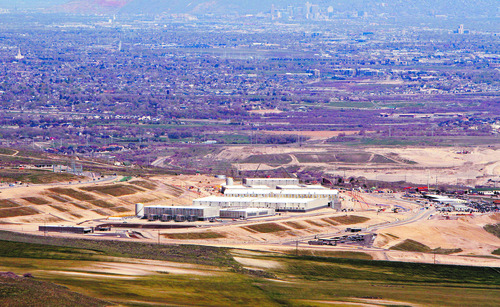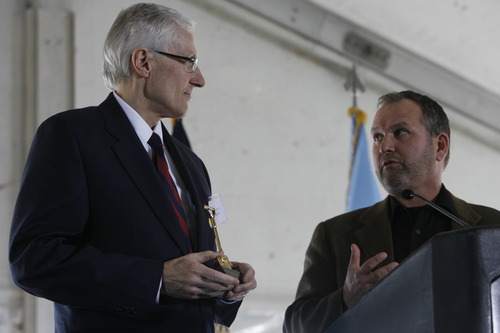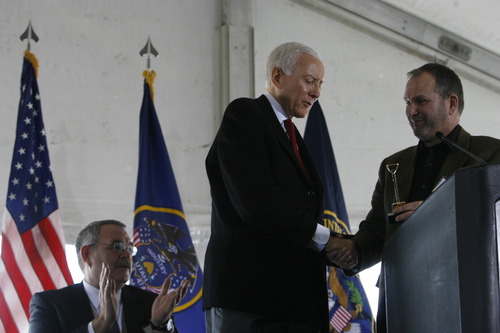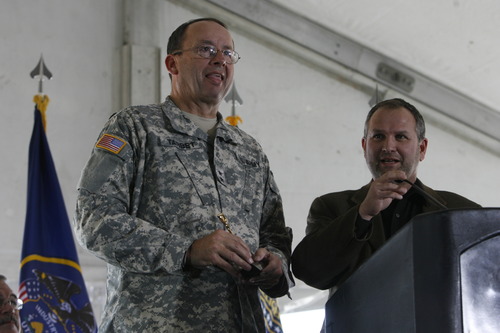This is an archived article that was published on sltrib.com in 2013, and information in the article may be outdated. It is provided only for personal research purposes and may not be reprinted.
Utah officials are backing off a law that could tax the energy used by the National Security Agency's new data center, in part because it was discovered former Gov. Jon Huntsman once said the state would not raise electric rates on the center for at least six years.
Rick Mayfield, the director of the Utah Military Installation Development Authority (MIDA), which could impose the tax, on Thursday said an attorney for the authority has been speaking with an NSA attorney to write an amendment to the law enacted this year. The Utah Legislature would then consider a bill when it meets in January.
"We think what's going to happen is there will be proposed legislation that will exempt the [Utah Data Center] from this tax," Mayfield. "What we didn't understand was the prior administration made a promise that for six years there wouldn't be an increase" in electricity rates.
Mayfield said MIDA staff recently learned Huntsman made that commitment when he was trying to lure the data center to Utah, though Mayfield said no one in Utah or NSA headquarters in Maryland can find documentation of it. Mayfield didn't know when the clock was to begin ticking on the six-year commitment.
That might not matter. Mayfield said it hasn't been decided whether a new bill would exempt the data center from the energy tax for six years or permanently. In any case, the final language of the bill will be up to lawmakers.
An NSA spokeswoman declined to comment on Thursday. Huntsman did not respond to requests for comment sent through his spokesperson.
The NSA's data center in Bluffdale is scheduled to be operational in September or October. It will be one of the largest digital-storage facilities in the world and has gained attention since former U.S. intelligence contractor Edward Snowden began leaking classified documents related to NSA information gathering. The data center is likely to store some of the telephone metadata, Internet records and personal emails collected by the NSA.
The U.S. Army Corps of Engineers has estimated the NSA facility will require 65 megawatts of electricity to run its equipment around the clock, which would put its annual power bill at about $18 million. (A Wired magazine article published in 2012 estimated the electrical bill at $40 million a year.)
MIDA works with private developers who lease and improve military properties in Utah. MIDA can assume a project area, much like a city annexing a piece of land, and install utilities and impose taxes.
The NSA contracted with MIDA to install some utilities for the data center.
In March , the Utah Legislature passed HB325, a bill that allows MIDA to tax its project areas on the electricity they use.
The tax can go as high as 6 percent.
MIDA attorney Paul Morris said he informed the NSA of the bill before it received a hearing in the Legislature, but the country's top electronic spy agency didn't take notice of HB325 until weeks after Gov. Gary Herbert signed it.
"The long and short of it is: Long-term stability in the utility rates was a major factor in Utah being selected as our site for our $1.5 billion construction at Camp Williams," Harvey Davis, NSA director of installations and logistics, wrote in the April 26 email to Herbert's office. "HB325 runs counter to what we expected."
Mayfield had said MIDA hadn't planned to impose the tax on the data center in the coming year, but that apparently didn't soothe the NSA.
The data center would be the only facility exempted from the bill, Mayfield said, meaning MIDA could still apply the energy tax on its other projects.
MIDA has a mixed-use development it helped facilitate at Hill Air Force Base, a military recreation facility in Wasatch County and has had discussions with the Department of Defense about alternative energy projects in Utah's West Desert, Mayfield said.
Twitter: @natecarlisle —









